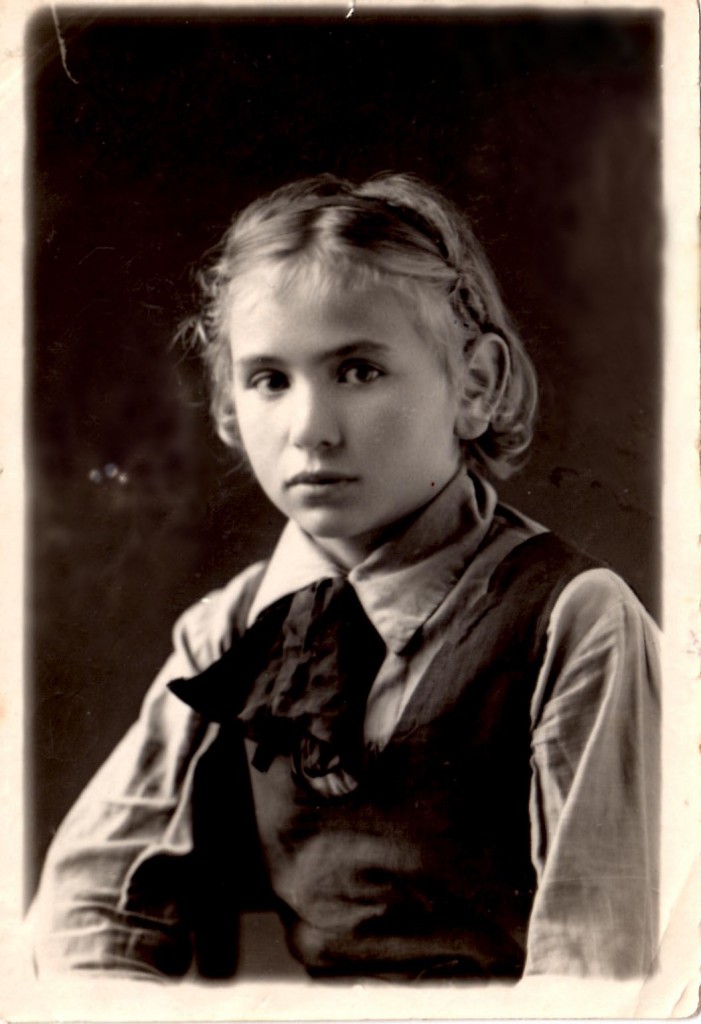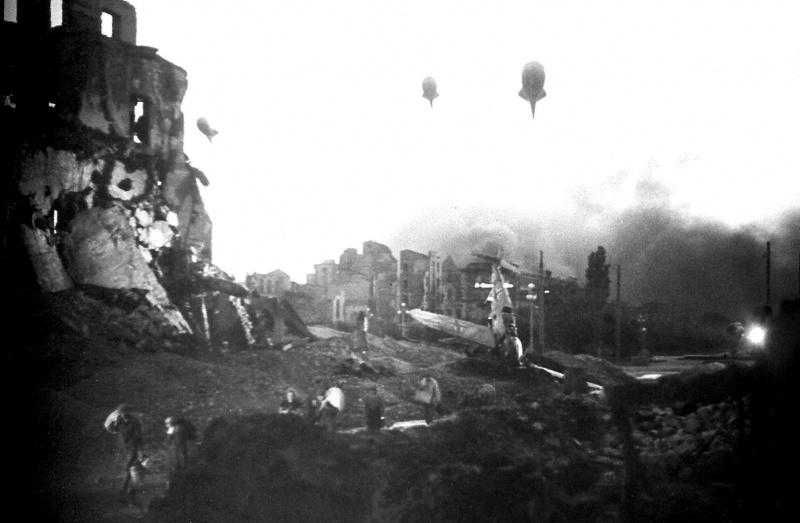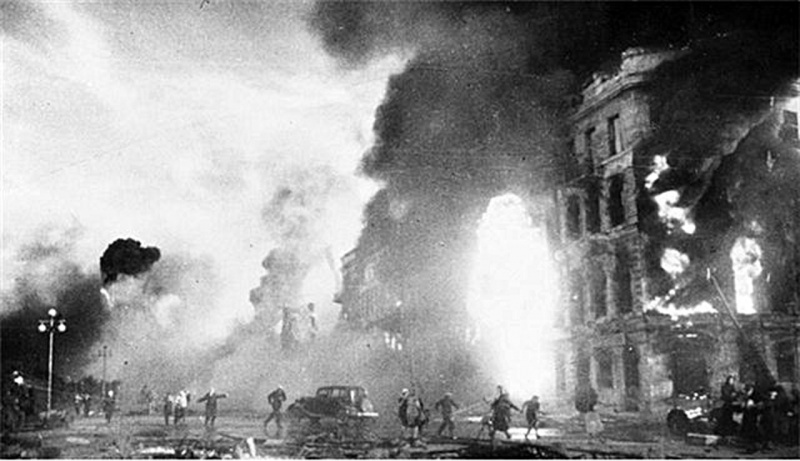By ANNA KORDUNSKY
Galya and her family had been living in the bomb shelter under the ruins of her apartment building for two weeks when unexpected visitors came down the stairs: five Soviet soldiers, three of them wounded in street battles that were moving closer to the Red October district by the hour. No one spoke. Galya, a twelve-year old girl, watched one of the women tear a tattered nightgown into swaths of fabric to create bandages. Galya’s father gave her a piece of gauze and asked her to pull it apart, thread by thread. She wondered why. Then someone rolled the threads into a ball to substitute for cotton in tending an open wound.
Later that evening, three more Russian soldiers came. They climbed down the steps slowly, carrying a heavy black barrel, and dropped it on the floor with a thud. “A cannon?” Galya thought, “here?” Her father, who had returned from the war wounded just four weeks ago, said it was a mortar. The soldiers settled under a narrow window cut through the concrete just under the cellar’s low ceiling. Propping the barrel against the slit, they pointed its hollow tip into the bombed-out yard.
Again, they moved in silence. The earth shook with explosions far and near, the air was thick with smoke. People squatting on the floor asked no questions.
It was early September 1942, two weeks after Galya’s hometown, Stalingrad, erupted in fire on August 23 – the day when German airplanes unleashed a round-the-clock rain of bombs on the city. Block by block, the bombing reduced Stalingrad to smoldering ruins. The city was surrounded from three sides, locking in hundreds of thousands of residents in a tightening ring and leaving only one escape route – across the Volga river, into the steppes on the far shore, and further to the east.
 For Galya, days and nights had blended into an endless agonizing wait. When the blasts hit particularly close, she huddled with her parents and her brother Volodya, one year older, as they spread their arms over each other’s shoulders, bowing their heads. Their home, a two-bedroom apartment on the third floor directly above the shelter, was gone. All that Galya saw when she stepped outside during a lull in the bombing were two barren walls left from their neighbors’ room. She noticed a book from her family’s old library in the rubble.
For Galya, days and nights had blended into an endless agonizing wait. When the blasts hit particularly close, she huddled with her parents and her brother Volodya, one year older, as they spread their arms over each other’s shoulders, bowing their heads. Their home, a two-bedroom apartment on the third floor directly above the shelter, was gone. All that Galya saw when she stepped outside during a lull in the bombing were two barren walls left from their neighbors’ room. She noticed a book from her family’s old library in the rubble.
They were hungry. Food salvaged from the destroyed building was shared by all and had quickly ran out. Their initial disbelief that their city could fall so quickly, so brutally, had long been eclipsed by exhaustion and fear. And yet they were waiting, waiting, not daring to risk making their way to the Volga.
That evening in early September, the wait ended. “It is terrible for you to stay here,” one of the soldiers told the people in the cellar. “You must not stay here.”
Shortly afterwards, Galya’s parents spoke to her and her brother. They would be leaving later that night, they said. But it was necessary to wait until it was completely dark to try to pass without attracting the notice of the bombers overhead.
The family left without packing.They had nothing to carry. Their only possessions were the clothes they wore – Galya’s father still in his army greatcoat, his shrapnel-strewn right arm in a sling made from a headscarf, she and Volodya in light summer jackets. The air was chilly; autumn had settled in.
It was a relief to walk up the stairs for the last time. Distant rumblings on the city outskirts, where the night sky glared smoky red, made Galya think of what would happen if the fighting caught up with them. She wanted to get as far away as possible, as quickly as they could.
They started to make their way toward the river by crawling: first Galya’s mother, then her father, who struggled awkwardly on his left side, his right arm pressed to his chest, his left pulling his body forward, then she and Volodya, focused on keeping up. A few others from their shelter were following. Galya knew other people were around them, but did not look to see how many.
They travelled about a mile down streets they used to know well: past what was left of the food store, past where they once took the bus to the beach. Apart from a few building carcasses, the streets were heaps of rubble on both sides: bricks, broken furniture, shards of glass, torn-up pavement. It was too dark to see human bodies, but their heavy smell overpowered even the smoke.
Every few minutes, balls of white light erupted in the sky with a crackle and slowly trailed downwards, illuminating the ruins below. Each time, Galya froze, hoping that the light would not descend over their heads. The distant fighting felt so close that she feared someone’s hand would grab her leg any second.
It took them several hours to make it to the pier. They started to pass more and more people crouching in the rubble, sitting on the ground, then standing. In the dark, Galya saw the faint reflection of lights in the water where a large barge was docked. Wounded soldiers were being loaded onto an open deck – an endless chain of stretchers carried from under a canopy on the shore. Several officers were guarding the entrance to the pier, keeping the civilians away.
“Please just wait for a few hours,” one of the officers was saying. “We barely have room for the wounded. The boat will unload them and come back for you.” The crowd was silent; there were no tears, no pleading. Galya’s parents prepared to wait.
Then a patrolling soldier called out to them, “Hey, old man!”
Galya did not at first realize that the soldier was looking at her father. He was stooped over, his greatcoat hanging loosely from his shoulders, his cheeks emaciated, his beard unshaven for two months, his right arm in a sling. He did look like an old man then, at thirty three, Galya later thought.
The soldier and her father spoke for a few moments. It may have been because her father had himself just returned from the war, and because he was still wearing his army greatcoat, that the family was allowed on the barge. They were among a dozen civilians – perhaps two or three more families – that boarded the ship. Others stayed: a dark silent mass of people, peering through the dark at a handful of vessels moving across the Volga. Most of them were probably able to cross the Volga, Galya hopes; she tried not to think of those who did not manage to leave.
The barge moved at the first rays of dawn, the start of an excruciatingly slow trip across the river that took two hours. What Galya remembers most clearly from the crossing was being afraid to step on wounded soldiers. There were so many of them, lying in endless rows on the deck, that she was scared to walk. She tiptoed past the bloodied bodies, dizzy and disoriented from the sight, and finally came to sit by the railing – she had a feeling someone had sat her down.
The hum of the German planes came overhead. One bomb, then another must have fallen into the water not too far away, because the boat rocked heavily, and a sharp metal rod from the railing dug into Galya’s back. She was crouching on the floor, her head buried in her knees. “Now they are going to hit us,” she whispered. “No, now.”
But the boat made it across.


